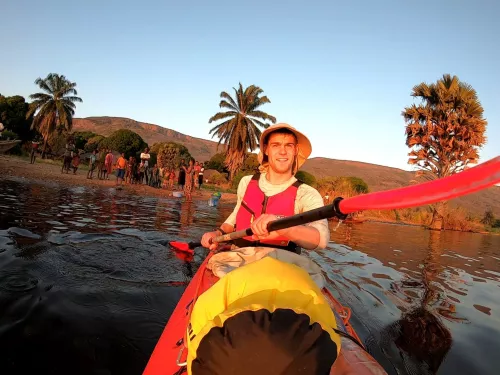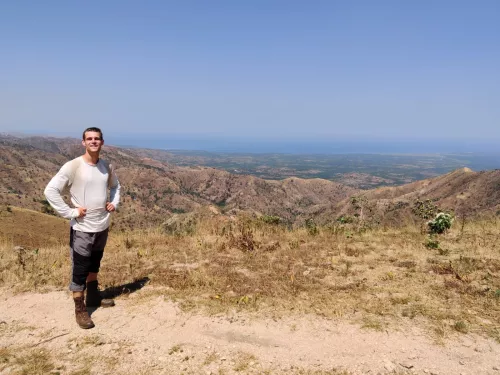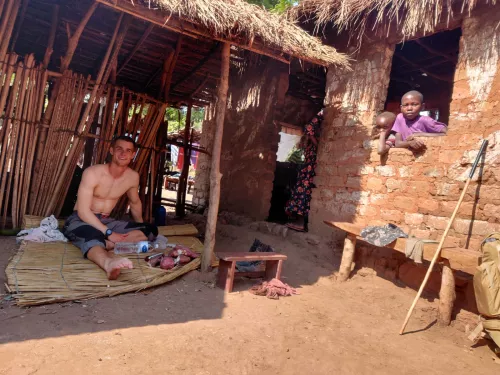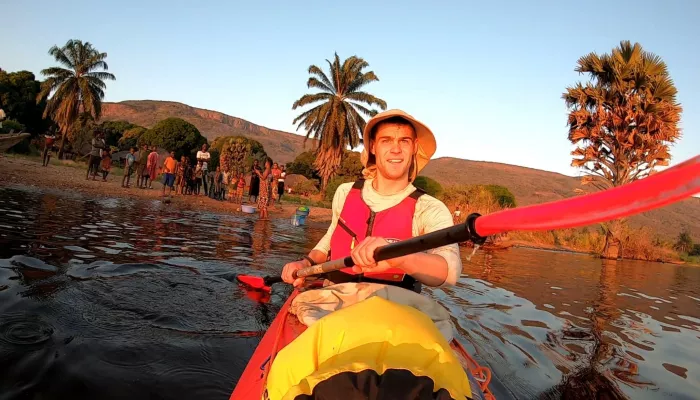Some people get flustered very easily; when trying to pick something for dinner, or figuring out what tube to get, or making a relatively easy Excel spreadsheet at work. Ben is not one of those people.
This summer Ben Harris, 22, attempted to become the first person to kayak solo along Lake Tanganyika, the longest lake in the world, raising money for Centrepoint along the way. Bar a 5k jaunt around a Welsh coast earlier this year, Ben had never kayaked before, and he planned to do the trip right before his final year of university.
So far, so stressful. Only, Ben has the nonchalance of someone listing what they had for breakfast. The trip was a year in the making, and he talks about hippos, poachers, and storms with the same measured tone as when he’s telling you how his degree in Geography at Bristol Uni is going. This is to say, Ben is the perfect person to take on such a huge challenge.
He started his trip at the southern tip of the lake, in Zambia’s Mpulungu, and would end in Burundi, at the Northern end. Ben didn’t consider any other kind of travel down the lake; swimming would have been too treacherous, so kayaking was the easiest way to navigate the 676km span of water – or so he thought.

Ben on the lake
“It went a bit wrong…” He says. “I’d pictured it to be serene, but the wind would blow at certain times in the day, and when it’s an offshore wind you can get in trouble – you’re being pushed out into a lake that’s 40km across in choppy conditions. You’d be stuck with no real rescue service.”
Ben knows this because it happened to him. On his second day. “A fisherman came and rescued me; he pulled me out the water. Where I’d capsized was a crocodile hotspot, so I was lucky.” In fact, crocodiles had become such a problem in that area that locals couldn’t get close to the lake’s edge anymore – they’d attach containers to a large stick in order to retrieve water. Then, two weeks later, Ben was chased by a hippo: “They’re the biggest killer in Africa – I’ve never moved so fast in my life!”
But between all the aquatic killers lurking under the surface, it turned out nothing was more dangerous than the water itself. Ben was about two weeks into his trip – 350km down the lake – when he hit a storm during a remote stretch. “It was about 80km between villages. The waves picked up and I had to get out of the lake, but it was very steep and rocky. I was stuck on the water.”
Eventually he found a small area he could pull his kayak onto, where two hills met. Ben could see on his map there was a village about a kilometre away, but the bush surrounding him was so thick it took 90 minutes to walk there. When he reached his destination, there was no village, and no one to help. Ben headed back and attempted to sleep next to the kayak through the storm, lashing it to a tree, but the waves were too strong: “I lost the kayak.”

Ben outside
That’s the thing with an expedition like this: no matter how hard you train, nothing can prepare you for the reality. And Ben did train. His hopes to join the Marines in 2022 meant he was already sticking to a pretty rigorous fitness regime (“pull-ups, press-ups, sit-ups, and a lot of running”) and he had worked hard to track down anyone with local knowledge. “Before you leave,” he says, “you get excited about planning every detail meticulously. As soon as you get there, it goes out the window. It’s important to plan, but it’s also important to realise you need to be able to think on your feet and adapt to situations as they change.”
Ben certainly hadn’t planned for this. But he was able to adapt: “I knew there were practical steps I could take. Getting my kit dry, making sure I had water. Putting out comms on my satellite phone that I needed to be rescued. Setting up my tent as a beacon that could be seen from the lake. By the end of the day, help came.”
This help arrived in the form of a man in a speedboat. Ben had stayed with the guy at the start of his trip, as he’d had local knowledge of the lake. They sped back to his lodge where Ben could recuperate and plan his next steps.
“I decided to walk,” he recalls. “To the lake’s northern point. The first thing on my mind when I got to the lodge was getting a pair of boots.”
A pair of knock-off combat boots at a market two hours away became Ben’s ticket to the finish line. He was dropped off near where he’d been stranded and set off in his new footwear, “which felt quite good at the time – but they didn’t have an inner sole…”
Inevitably, the boots quickly fell apart, but there was someone at every village who was skilled with a needle and thread. The level of hospitality from locals was astounding: “It’s just normal to get offered a meal as soon as you turn up. I got quite sick and was taken in by a family who let me stay in their bed. They went so far out of their way to help me. It was just incredible.”

Ben resting after a long day.
With Ben’s limited Swahili vocabulary – “Food, sleep, blisters!” – he was able to get the help he needed wherever he went, thanks to the generosity and resourcefulness of locals.
And the blisters from the boots were bad – really bad. “When every step is just hot, searing pain, and these are just your first few steps of the day, that was the most mentally challenging.” A better pair of boots from his mum awaited him in a city 200km away, but by that point the damage was done: “My feet were already knackered, so it didn’t really matter how comfy the new boots were!”
By the time Ben had finished his expedition in the city of Bujumbura, he had stayed a month longer than originally planned. All of it – the training, the lost kayak, the walking in bad shoes – was for Centrepoint. In the end, Ben raised a massive £12,234 for our charity. “It’s incredible,” he says. “I can’t believe how generous people have been. Homelessness is something that’s close to my heart. I think we can do a lot more to help, so anything I can do to direct some money in the right places, I’m very keen to do.”
Mercifully, it wasn’t all blisters and hardship. Ben says he’s learnt so much from the people he met – how to be resourceful and think of solutions instead of faltering. And there were so many simple, beautiful moments: “When the sun set over the lake and the mountains, that was incredible; that’s something that sticks out in my mind.”
So, would he do it again? Well, no. “I’d like to do something else next time – maybe something a little different,” he says. “I’d like to do a much longer walk in a similar part of the world – but with better shoes next time...”

